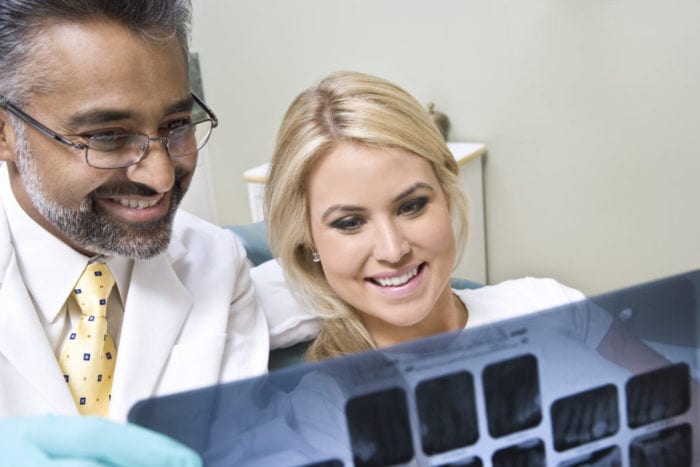In dental practices like ours, the terms “reconstructive dentistry” or “restorative dentistry” get kicked around all the time. Many patients may not really understand what we mean when we say Dr. Doray is a restorative dentist or that we do reconstructive dentistry. Originally published in a blog by Ideal Dental Solutions in 2016, here’s an excerpt from a great article explaining those terms.

Reconstructive Dentistry – What Is It And Is It Right For Me?
By: Ideal Dental Solutions
Reconstructive dentistry is a term that encompasses a wide variety of dental procedures. In general, it is the process of restoring a clean, functional, and aesthetic smile to someone who has experienced dental issues. Missing or damaged teeth, crooked teeth, bone loss, and gum disease are the primary reasons patients seek restorative procedures. The benefits of reconstructive dentistry are both psychological and physical, often improving a patient’s wellness and self-esteem at the same time.What is Reconstructive Dentistry?
Reconstructive – or restorative – dentistry includes the replacement of missing teeth, the repair of damaged teeth, and treatments used to address faulty bites and gum disease. It may involve jawbone and jaw joint treatment, or may simply involve replacing older dental work that is worn out or unattractive. The treatment options can generally be grouped into three categories:
- Restorative: fillings, crowns, bridges, inlays and onlays, dentures, and implants
- Corrective: jaw and bite procedures, tissue grafting, tooth extractions, orthodontia and treatment of disease
- Cosmetic: whitening, veneers, bonding, and orthodontia (straightening)
Patients with severe issues may need reconstructive procedures from every category, but often they only need one or two items to be addressed. If the damage is extreme, full mouth reconstruction may be necessary to rebuild all the teeth in the patient’s mouth. Dentists may utilize a combination of cosmetic and restorative treatments, like veneers and crowns, to achieve the optimal “smile makeover” for a patient.
Is reconstructive dentistry right for me?
There are many reasons that reconstructive dentistry may be right for you.
- Do you have damaged or missing teeth?
- Do you have crooked teeth?
- Were you in a traumatic accident that damaged your jaw and/or teeth?
- Do you grind your teeth when you are under severe stress or while you sleep?
- Do you have enamel issues or deep crevices in your teeth that make them prone to cavities?
- Do you have “wear and tear” on your teeth simply due to age?
- Do you have gum disease due to years of dental neglect?
- Have you experienced bone loss in your jaw due to disease or illness?
- Has smoking caused gum or other dental problems?
- Are you unhappy with an unattractive smile?
- Are you unhappy with mismatched or unattractive old dentistry?
If you answer yes to any of these questions, then you may be a candidate for dental restoration or reconstruction.
What are the benefits of reconstructive dentistry?
Reconstructive dentistry has both physical and psychological benefits. Once a smile has been properly restored, most patients begin to focus more on their oral hygiene. They tend to cut out some of the sugary, acidic foods that were hurting their teeth, and sometimes even quit smoking. Misaligned and missing teeth can also be painful, causing toothaches or headaches. Restoring and balancing your bite will relax muscles and eliminate pain.Although the health benefits are very important, a restored smile can also do wonders for your appearance and self-esteem. When people are proud of their teeth, they tend to be more confident and socialize more with others. Your smile also impacts how others perceive you! A smile with beautiful teeth is more attractive than one with missing or damaged teeth – resulting in an advantage during job interviews and other social situations.
If you think you may be a candidate for reconstructive dentistry, contact Pamela G Doray DMD in Philadelphia, PA. We would love to make the smile of your dreams a reality. Click here to request an appointment with Dr. Doray.
